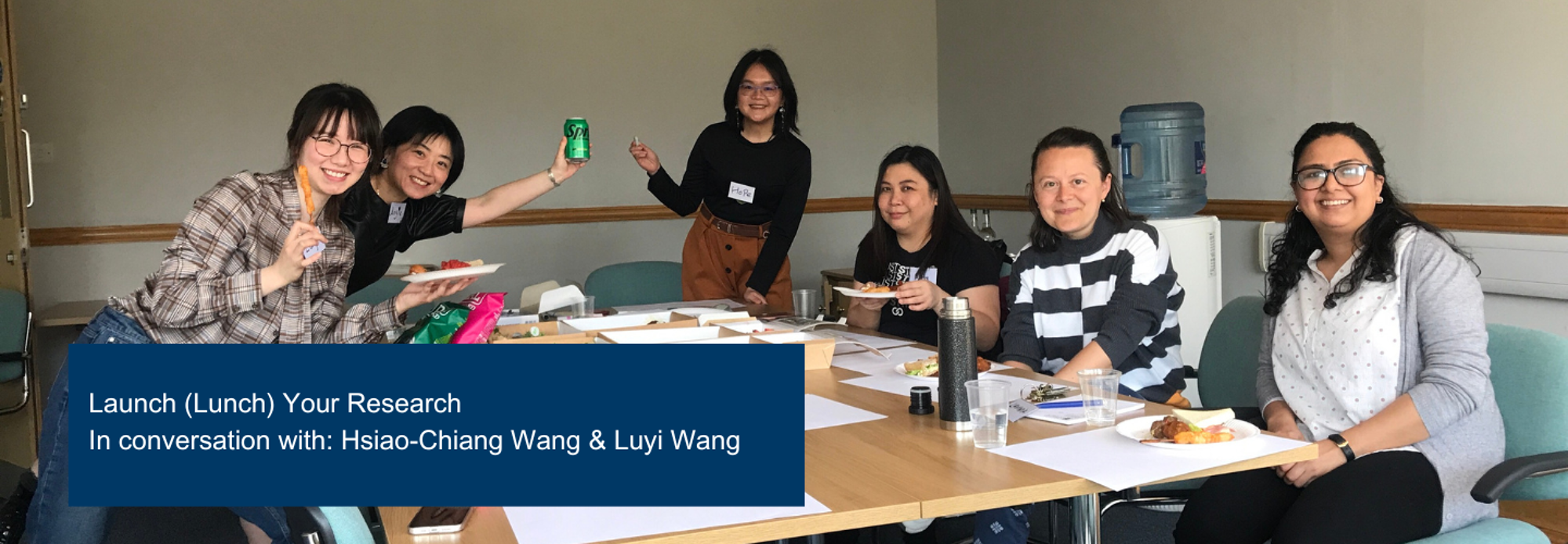
Peer-to-Peer Workshop Series: Launch (Lunch) your Research
Why did you take part in the Peer-to-Peer programme?
Luyi: I didn't always know who to turn to for advice, had many curiosities about others' solutions and experiences and accumulated some small achievements and failures that I wanted to share with and caution others about.
Hsiao-Chiang: I want to participate in and contribute to our PGR community. Although the College of Social Sciences and School of Education offer us various learning resources and opportunities, it is impossible to suit everyone's needs. Therefore, PGRs should utilize their agency to shape this environment.
What inspired you to run 'Launch (Lunch) Your Research' and what did you hope to achieve?
Luyi: At the very beginning, I had no idea what this workshop would be like, and I wasn't sure how I was going to lead and organize it. So, I started to think about what kind of workshop I would want to take part in myself. Then, one day, an idea popped into my head - how about... we eat something together? Maybe we can have lunch and a discussion at the same time?
Hsiao-Chiang: Recognizing the value of a nurturing network, crucial for preventing impostor syndrome among PGRs, I noticed a gap: while many PGRs desire this community, some may lack the means to connect effectively. The 'Launch (Lunch) Your Research' workshop series was conceived to bridge this gap, providing a platform where PGRs could come together, share their research journeys and bolster each others confidence in an environment of trust.
Take us through the process of setting up and running your workshops.
Luyi: I began considering the launch of the Peer-to-Peer workshop series with encouragement from Dr Dely Elliot. Subsequently, after discussions with her and Dr Lavinia Hirsu, I received valuable advice and inspiration that helped shape the workshop in terms of format, content, number of participants, dates and themes.
Hsiao-Chiang: Leveraging participatory action research greatly informed my approach to workshop preparation. An illustrative example is the 'River of Research Life' exercise I developed for the workshop's outset. This activity enabled participants to candidly discuss their motivations, challenges, opportunities, and research contributions.
What lessons did you learn through hosting 'Launch (Lunch) Your Research'?
Luyi: My takeaways went far beyond just workshop organization. I learned interesting perspectives and useful skills and tips from fellow PGRs at the events. More importantly, I made new friends.
Hsiao-Chiang: Three vital lessons emerged from the workshop series: effective communication, collaborative prowess, and the art of co-creation. Communication stood out as a linchpin throughout the workshop series. Recognizing its dual nature- encompassing both speaking and active listening- was pivotal. Historically, I like many PGRs, emphasized speaking over listening.
If a fellow student was considering taking part in the Peer-to-Peer programme, what would you tell them?
Luyi: This is a fantastic opportunity for you to grow and to receive the support and friendship from other PGRs through your own creative space.
Hsiao-Chiang: Your influence is far greater than you realize! As a vital member of the PGR community, you hold the potential to mold and cultivate inclusivity within it. By taking proactive steps and collaborating with fellow peers, I discovered a newfound sense of empowerment, enabling me to effect positive change and foster mutual support. Remember, each action you take contributes to a stronger, more united PGR network!
We support each other and move forward together - Hsiao-Chiang Wang
PGR Student Profiles

Name: Luyi Wang
Research interests: music education, social inclusion, active therapies and music therapy.
'My favourite thing about studying at Glasgow is the diverse and supportive environment.'

Name: Hsiao-Chiang Wang
Research interests: heritage education, refugee integration, cultural right and participatory action research.
'My favourite thing about studying at Glasgow is that there is never a dull moment in my PhD journey.'





